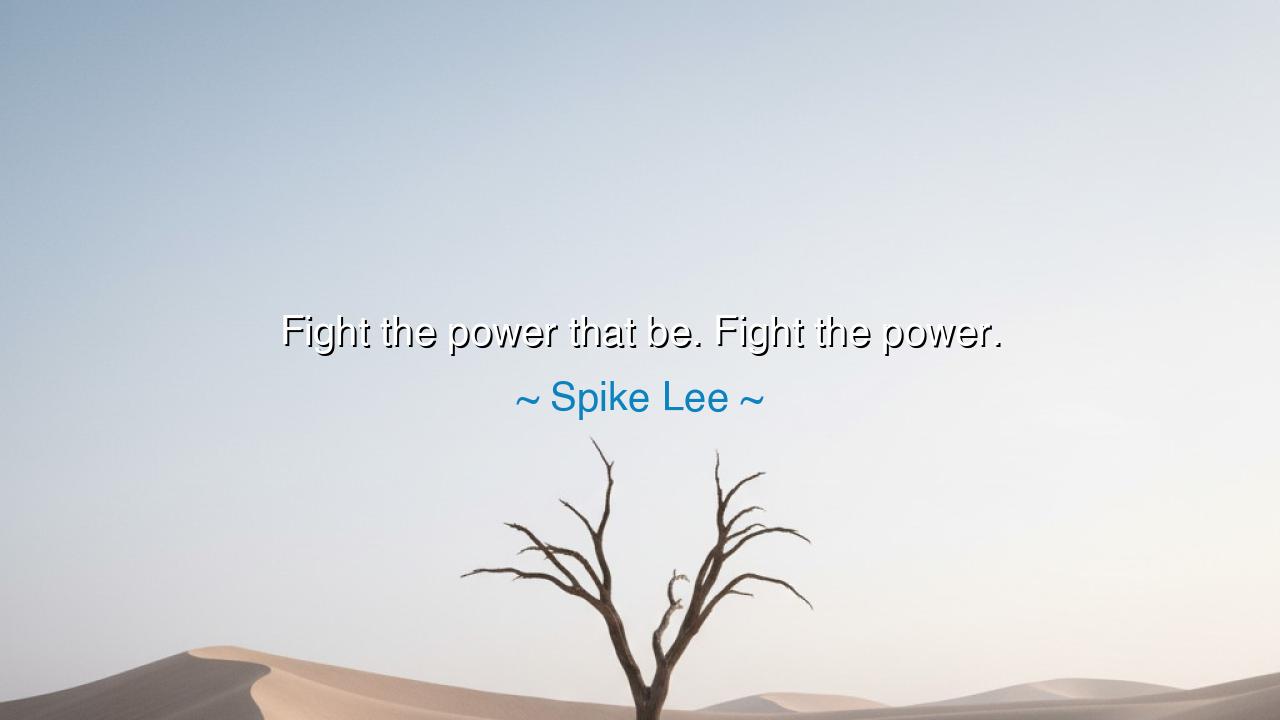
Fight the power that be. Fight the power.






Hearken, O children of courage, to the clarion call of Spike Lee, who exhorts all to fight the power that reigns over them. His words are a summons to vigilance and resistance, a reminder that injustice, oppression, and the arbitrary exercise of authority demand scrutiny and defiance. Herein lies a teaching for the ages: the measure of a society, and of each soul within it, is not found in passive acceptance, but in the courage to confront those who wield power without justice.
The origin of this reflection lies in Lee’s life as a filmmaker, storyteller, and chronicler of the struggles of marginalized communities. Through cinema, he bore witness to the inequalities and prejudices embedded in institutions, culture, and law, and his voice became a beacon of defiance. In the simple yet profound exhortation—fight the power that be—he channels the spirit of those who refuse subjugation, insisting that power must be held accountable to truth, equity, and conscience.
The meaning of this aphorism is profound: authority, when unchecked, can become oppressive, and the complacency of the many strengthens tyranny. Lee teaches that the righteous path often requires confrontation, persistence, and moral courage. To fight the power is not to sow chaos for its own sake, but to demand justice, to challenge inequality, and to awaken the hearts of the people to their own dignity and agency.
History provides luminous examples. Consider Martin Luther King Jr., who, in the face of systemic oppression, fought the power of segregation and discrimination. Through marches, speeches, and nonviolent resistance, he challenged the entrenched authorities of his time, reshaping society and inspiring generations. His struggle demonstrates the timeless truth that confronting injustice requires courage, strategy, and unwavering commitment to the cause of righteousness.
Moreover, this teaching extends beyond grand movements to daily life. In the halls of governance, the marketplaces of commerce, and the quiet corners of society, those who resist arbitrary authority and stand for fairness, truth, and compassion embody the same principle. Spike Lee reminds us that moral courage is not occasional—it is the enduring duty of every human who cherishes freedom and justice.
O generations yet to come, heed this call: never bow unquestioningly to power, nor allow injustice to pass unchallenged. Fight the power that be, with courage, insight, and conviction, for it is through the struggle against tyranny and inequity that the human spirit achieves its greatest triumphs. Let your resistance be principled, your actions fearless, and your legacy a beacon of justice and truth across the ages.






TTTran thanh thao
Reading this, I wonder about the moral and strategic dimensions of opposing authority. Who decides which powers are legitimate to challenge, and how do we balance justice with stability? I’m curious how this mantra has influenced social movements historically, from civil rights to contemporary activism. Does Spike Lee advocate for persistent vigilance, or are there moments when patience and diplomacy are more effective? It raises the question of how individuals can sustain courage and ethical clarity while resisting entrenched systems.
DAChu Duc Anh
I feel inspired and challenged by this quote. How does one translate this call into tangible action without incurring undue risk? I’m curious whether the phrase is more symbolic, encouraging critical thought and questioning of authority, or if it’s a literal call to confront oppressive systems. Could community organizing, voting, and education be modern forms of 'fighting the power'? This also prompts reflection on how culture, music, and media can amplify resistance and give voice to marginalized communities.
NBNhung Bich
This perspective raises important questions about power dynamics. What does Spike Lee mean by 'the power that be,' and how do we identify unjust systems? Could this message inspire ethical responsibility alongside activism, ensuring that resistance is principled rather than reactive? I’m curious how different generations interpret this call—does it retain the same relevance today in the face of evolving political and social landscapes? This quote makes me reflect on the role of individual and collective agency in shaping societal change.
L830.Pham Thi Kieu Oanh lop 8.8
I find this statement thought-provoking because it distills resistance into a simple, powerful directive. Could fighting power be more about questioning authority and cultural norms than literal conflict? I’m curious how this phrase resonates across different contexts, such as civil rights, corporate structures, or political regimes. Does it imply a lifelong struggle, or moments of decisive action? This also makes me reflect on the balance between resistance and pragmatism—when is it strategic to fight, and when is collaboration more effective?
MYMeo Yun
Reading this, I feel a strong sense of urgency and defiance. I wonder if Spike Lee’s message is meant to inspire personal reflection or collective action. Does 'fight the power' imply confrontation, reform, or both? How can ordinary people discern which powers are worth challenging and which require compromise or negotiation? I’m also curious how art, media, and storytelling can act as tools to fight systemic injustice and mobilize public awareness effectively.